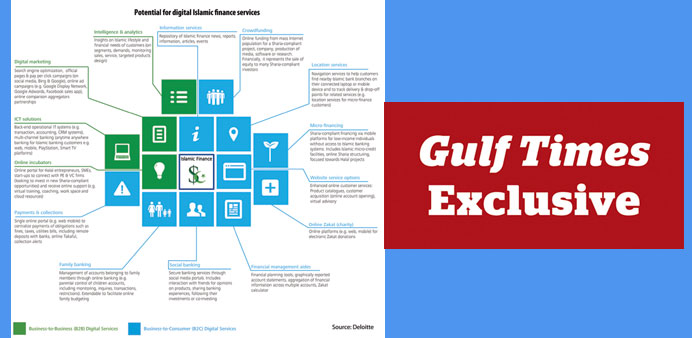By Arno Maierbrugger/Gulf Times Correspondent /Bangkok
The recently released report “State of the Global Islamic Economy” commissioned by Dubai Islamic Economy Development Center and produced by business intelligence provider Thomson Reuters is highlighting a lot of new trends in the Islamic economy, including East Asian countries enabling their domestic markets to tap into Islamic financing, new developments in halal food and tourism, as well as in clothing and fashion and in pharmaceuticals and cosmetics.
However, and most importantly, the report points out that the Islamic economy is embracing the digital age which it sees as a “new frontier” in the Muslim world after “the digital component has woven itself into the lives of many Muslims worldwide as an integral part of their lifestyle,” as the report puts it. This includes Qur’an and halal travel mobile apps, online Islamic education services or tools for locating the nearest halal restaurant or the nearest mosque.
The digital age will also bring Islamic finance a big step forward, another recent report, “The Digital Islamic Services Landscape“ authored by consultancy Deloitte and sponsored by Kuwait-based Noor Telecom, points out, highlighting the huge untapped potential of the digital Islamic services market.
“Technology is arming us with tools that are far more powerful and effective than anything in the past – the impact of which is fully evident in the Muslim community,” says Ayman al-Bannaw, chairman and CEO of Noor Telecom, adding that “by observing and following this trend, we have identified a strong need for digital Islamic services.”
With regards to Islamic finance, the report identifies promising areas in both the business-to-consumer and the business-to-business sector. For consumers, there is potential in Islamic finance information services, as provided, for example, by Malaysia’s Islamic Finance News (www.islamicfinancenews.com), the leading online news portal on Islamic Finance. Other sectors are crowdfunding for Shariah-compliant projects or businesses, as already offered by Shekra (Egypt), Zoomal (Lebanon) and LaunchGood (Detroit, US), as well as location services to find Islamic bank branches as offered by Bank Islam Malaysia.
Islamic microfinance is another big sector that has begun going digital and offering online microcredit facilities focused towards halal projects. Examples include Blossom (Indonesia), an Islamic microfinance online scheme which additionally uses the crypto currency Bitcoin, Kiva (US), a charity platform enabling small interest-free loans for development projects, and Musoni, a mobile microfinance application launched in Kenya together with Grameen Foundation and MasterCard.
Other options the report identifies in the digital Islamic finance sector are website development and services for Islamic online banking, including virtual advisory and financial planning tools.
Existing examples for Islamic banks with enhanced online and/or mobile customer service are Al Rayan Bank (formerly Islamic Bank of Britain) and Dubai Islamic Bank with its Al Islami Mobile Banking application. Such proprietary applications can be complemented with online portals that centralise payments such as fines, taxes, utility bills, takaful payments and the like. The UAE’s mPay service is a noteworthy example of a single mobile application which can be used to make all types of government payments, the report points out. This is a role model for regional telecom operators, airlines and utilities companies to follow suit with similar mobile payment applications and account management services for customers.
Other applications for digital Islamic finance include online zakat for electronic donations such as Singapore’s Zakat.SG app developed by the Islamic Religious Council of Singapore, and Malaysia’s E-ZakatPay service; as well as banking applications for Muslim social networks and family banking via closed online portals.
Business-to-business applications in Islamic finance have an even wider scope. They include online portals for halal entrepreneurs, startups and small and medium Islamic businesses designed to connect with investors, an area that is still in the very early stages in the Middle East, as well as tailored software solutions for Islamic banks, for example iWindow, an Islamic finance window operation for conventional banks, and iShraq, which provides Islamic investment and financing management models.
Islamic digital marketing and Muslim ad networks are the next big thing as the reports identifies great need for digital marketing services in Islamic Finance, together with intelligence and analytics in order to provide insights on Islamic lifestyle and financial needs of Muslim bank customers.
“The digital services landscape and the Islamic economy continue to expand at an exceptional pace,” concludes Dr Hatim El Tahir, director of Bahrain-based Deloitte Islamic Finance Knowledge Center Middle East, adding that “specialist services such as finance and marketing for the digital Islamic services sector are certainly gaining ground.”

